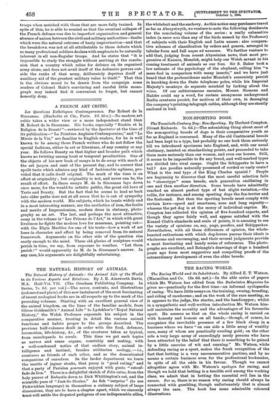A FRENCH ART CRITIC.
Les Questions Estlietiques Contemporaines. Par Robert de In Sizeranne. (Hachette et Cie., Paris. 3 f. 50 c.)—No modern art critic takes a wider view or a more independent stand than M. Robert de in Sizeranne. His books, especially "Ruskin et la Religion de la Beaute "—reviewed by the Spectator at the time of its publication—" La Peinture Anglaise Contemporaine," and "Le Miroir de In Vie," are familiar to English readers, for he is well known to be among those French writers who do not follow the special fashions, either in art or literature, of any country or any year. He follows Beauty on that higher and broader path which knows no twisting among local or temporal peculiarities. One of the objects of his new book of essays is to do away with much of the art jargon and cant of the present day, and to correct that spoilt taste which admires any kind of fashionable ugliness, pro- vided that it calls itself original. The mark of the time is an effort at originality ; but originality is not, and never can be, the result of effort. In these essays M. de la Sizeranne lays down once more, for the would-be artistic public, the great old laws of Taste and Beauty. But the fact that he seems to lead us back into older paths does not at all mean that he is out of sympathy with the modern world. His subjects, which he treats widely and in a most interesting manner, are the aesthetics of iron, the faults and merits of Impressionism, modern dress in statuary, photo- graphy as an art. The last, and perhaps the most attractive, essay in the volume is "Les Prisons de rArt," in which with great liveliness he fights the modern love for museums, pointing out— with the Elgin Marbles for one of his texts—how a work of art loses in character and effect by being removed from its natural framework. Arguments on the other side of the question rise easily enough to the mind. These old glories of sculpture would perish in time, we say, from exposure to weather. "Let them perish!" would apparently be M. de In Sizeranne's answer. In any case, his arguments are delightfully entertaining.






















































 Previous page
Previous page